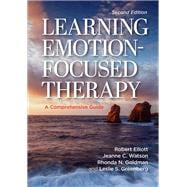
Learning Emotion-Focused Therapy A Comprehensive Guide
- ISBN13: 9781433838323
- ISBN10: 143383832X
- eBook ISBN(s): 9781433838330
- Edition: 2nd
- Format: Paperback
- Copyright: 2025-08-19
- Publisher: American Psychological Association
Note: Supplemental materials are not guaranteed with Rental or Used book purchases.
-
Your order must be $35 or more to qualify for free economy shipping. Bulk sales, PO's, Marketplace items, eBooks and apparel do not qualify for this offer.








